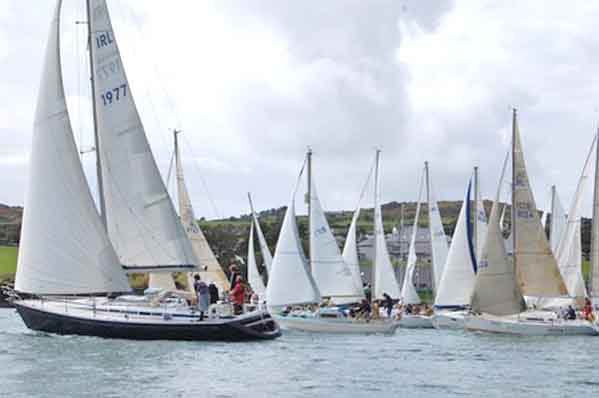Displaying items by tag: racing
Schull Harbour Sailing Club
 September League 2009
September League 2009
Schull Harbour Sailing Club was founded in 1977 as a summer sailing club and from its inception it has activately promoted leisure and competitive sailing in Schull. The first commodore was Billy Pope who had sailed in the area from the fifties in his yacht Pendua. He was joined by his brother Teddy in Harbar.
In the early seventies Billy and his crew were instrumental in setting up Cape Clere regatta on the Wednesday before Schull Regatta.
Informal racing took place during the years 75/76 until a small committee drew up the first set of club rules.
The first clubhouse was a caravan, which was parked at the back of the stone beach, close to where the public toilets are now. This was used for many years, until the upgrade of the pier.
The first trophy was presented by Sean Barnett owner of Barnett’s Hotel for a club Fastnet Rock race and is still raced for every July.
The boats in the first race in addition to the Pope brothers were Michael Murphy’s Coral Ballerina, Ronnie Goods Tundercrest, George Dwyer’s Madcap, and Frank Godsons Lyre 11.
Additional boats quickly arrived with Paul Murray and Kit Pearson each purchasing an Offshore 8. Vincent O'Farrell arrived in his Elizabethan and Pat Whelan in his large Moody ketch, Charlene. Myles Ronan moved on from the Flying Fifteens, when he purchased Kiemar, and Al Bird campaigned his GK 24.
James O'Flynn and Tom O'Brien made a regular Saturday trip from Baltimore and Bill Hilliard sailed up from Rossbrin.
The number of races increased annually as each boat owner sponsored a race, and the season now runs from May to September.
A junior racing fleet quickly grew as the large number of member’s kids took to the water, and successful leagues and sail training courses were held over the years.
The club now organizes the successful Calves Week Regatta every August, having taken over the running of the event from the local Regatta Committee, and uses the impressive Fastnet Marine Center as its headquarters.
(Details and image courtesy of Schull Harbour Sailing Club)
Schull Harbour Sailing Club, Schull, Co. Cork, or c/o Michael Murphy, Vermont, Grange Road, Douglas, Co Cork. Tel: 021 429 1878, email: [email protected]
Have we got your club details? Click here to get involved





























































